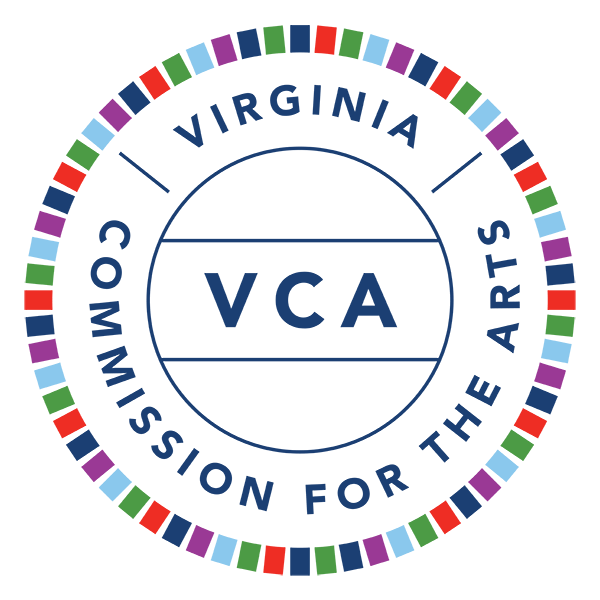
Accessibility Statement
The Virginia Commission for the Arts (VCA) believes that all Virginians have the right to access and experience the arts in our Commonwealth. As a state agency, we strive to meet and exceed federal accessibility standards to benefit our communities. We encourage all partners receiving VCA funds to consider improving their accessibility efforts.
The VCA is dedicated to improving the accessibility of this website. We are proud to maintain our AA accessibility rating according to the ADA’s Web Content Accessibility Guidelines (WCAG). If you are unable to access content or have enhancement suggestions, please contact:
Casey Polczynski, Ph.D.
Deputy Director & Accessibility Coordinator
casey.polczynski@vca.virginia.gov
Accessibility Resources
On this page, please find a set of resources that will guide arts visitors, artists, and arts organizations through their relationship with accessibility. If you believe we can improve this collection in any way, please contact us.
VCA Accessibility Handbook for Grantees
This foundational guide, developed by VCA staff and former NEA access coordinators, can quickly begin your accessibility work. We encourage our grantees to read this before proceeding to the below resources.
Know Your Rights: the Americans with Disabilities Act (ADA) and State Law
All public businesses and nonprofits must follow the requirements of the ADA, which requires that they not discriminate against people with disabilities, and that they remove any architectural barriers. Organizations that receive federal funding must also take special care to accommodate people with disabilities.
- Guide to Disability Rights Laws (ada.gov)
- Introduction to the ADA (ada.gov)
- Accessibility and Accommodation | Disability Law Center of Virginia (dlcv.org)
- Accessibility | National Endowment for the Arts
Commonwealth of Virginia Disability Services
- Department for Aging and Rehabilitative Services
- Department for the Blind and Vision Impaired (VDBVI)
- Department for the Deaf and Hard of Hearing (VDDHH)
- Assistive Technology Loan Fund and Assistive Technology System
Community Resources
The following organizations provide free services to people who identify as having disabilities. They include peer support, learning materials, live performance programs, and more.
Get Involved in Conversations About Accessibility
Whether you’re an artist with disabilities or someone looking to make your work more accessible, we hope you benefit from these groups and resources.
- Accessibility Hub | National Endowment for the Arts
- Leadership Exchange in Arts and Disability (LEAD) | The Kennedy Center
- VSA Research and Resources | The Kennedy Center
- Disability in the Arts | The Kennedy Center
- State Arts Agency Innovations | National Assembly of State Arts Agencies
Accessibility in Arts Spaces
Arts venues and any public spaces are required to be accessible for performers and audiences alike. These pages outline your rights and some examples of successful accessibility practice.
- Guide to Disability Rights Laws | ADA.gov
- Accessibility and Accommodation | Disability Law Center of Virginia (dlcv.org)
- Taking Accessibility From the Page to the Stage | American Theatre (link)
- Accessible Performances and Services | Virginia Stage Company
Additional Reading
If you would like to learn more about how organizations interact with accessibility, here are some helpful guides and websites.
Understanding Your Legal Requirements for Accessibility
NOTE: All VCA grantees receiving federal funding must now, according to section 504 of the Rehabilitation Act, have a completed self-assessment workbook and a designated 504 coordinator. If you do not receive federal funding, you still must comply with the Americans with Disabilities Act (ADA).
- Section 504 Self-Evaluation Workbook | NEA
- Laws and Compliance Standards | NEA
- Design for Accessibility: A Cultural Administrator’s Handbook | NEA
- ADA: Businesses That Are Open to the Public | Department of Justice
- ADA: Checklist for Existing Facilities | New England ADA Center
Accessibility Checklists and Self-Assessments
We encourage all of Virginia’s arts organizations to reflect on their accessibility using these self-assessments. However, the VCA does not penalize organizations for their results or require their submission.
- Brief Accessibility Checklist | NEA
Designed for user-friendliness, this checklist gives a high-level overview of federal compliance to accessibility coordinators.
- Arts and Culture Accessibility Self-Assessment | Open Door Arts
This wide-ranging assessment includes both federal requirements for accessibility, including the ADA and Rehabilitation Act, and many additional considerations related to communications, organizational philosophy, and programmatic access. Please use the code “VCA 2025” when you complete the self-assessment so that Open Door Arts can know how many organizations from Virginia are participating.
Helpful Accessibility Guides and Resource Hubs
- Accessibility Hub | NEA
- ADA National Network
- Partnership for People with Disabilities | VCU
- A Planning Guide for Making Temporary Events Accessible to People With Disabilities | ADA National Network
- State Arts Agency Innovations in Accessibility | National Assembly of State Arts Agencies
Professional Development for Accessibility
- Leadership Exchange in Arts and Disability (LEAD) | The Kennedy Center
- Accessibility Training | Mid-Atlantic Arts
- DC Arts & Access Network
- Center for Inclusive Design and Environmental Access | University at Buffalo
- Reports: Towards a Culture of Access | Open Door Arts
- Webinar: Investing in Accessibility and Disabled Artists | NASAA

